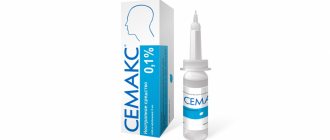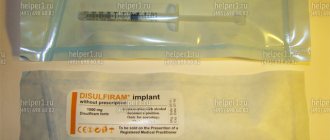Orungal®
— Effect on cardiac activity: in a study of the dosage form of the drug Orungal® for intravenous administration, a transient asymptomatic decrease in the left ventricular ejection fraction was noted, which normalized until the next infusion of the drug. The clinical significance of these data for oral dosage forms is unknown.
Itraconazole has a negative inotropic effect. Cases of chronic heart failure associated with taking Orungal® have been reported. At a daily dose of 400 mg of itraconazole, an increased incidence of heart failure was observed; at lower daily doses such a pattern was not revealed. The risk of chronic heart failure is presumably proportional to the daily dose. The drug Orungal® should not be taken by patients with chronic heart failure or with a history of this symptom complex, except in cases where the possible benefit significantly outweighs the potential risk.
When individually assessing the balance of benefit and risk, factors such as the severity of the indications, dosage regimen and individual risk factors for heart failure (coronary heart disease, valvular disease, obstructive pulmonary disease, renal failure and other diseases accompanied by edema) should be taken into account. Such patients should be informed about the signs and symptoms of chronic heart failure and monitored for their occurrence during the course of treatment. If such signs appear, taking Orungal® should be stopped.
Life-threatening cardiac arrhythmias and/or sudden death have been reported in patients receiving methadone concomitantly.
- Drug interactions: Concomitant use of certain drugs with itraconazole may result in changes in the effectiveness of itraconazole and/or concomitant drugs, life-threatening adverse reactions and/or sudden death. Drugs that cannot be taken concomitantly with itraconazole, are not recommended for concomitant use and/or are recommended for concomitant use with itraconazole with caution are listed in the section "Interactions with other drugs".
- Cross-hypersensitivity: Data regarding the presence of cross-hypersensitivity between itraconazole and other antifungals with an azole structure (from the azole group) are limited. If hypersensitivity to other azoles is present, itraconazole should be prescribed with caution.
— Interchangeability: interchangeable use of Orungal®, capsules, and Orungal®, oral solution is not recommended, due to the fact that the exposure of itraconazole is higher when used in the form of an oral solution than in capsule form, even when taking the same doses of itraconazole .
- Reduced acidity of gastric juice: with reduced acidity of gastric juice, the absorption of itraconazole from capsules is impaired. Patients with reduced gastric acidity due to illness (for example, patients with achlorhydria) or due to medications (for example, drugs that suppress gastric secretions), it is recommended to take Orungal® capsules simultaneously with acidic drinks (such as non-diet cola). The antifungal activity of the drug should be monitored and the dose of itraconazole should be increased if necessary.
- Effect on liver function: in very rare cases, severe toxic liver damage has developed when using the drug Orungal®, including several cases of acute liver failure with a fatal outcome. In most cases, this occurred in patients who already had liver disease, in patients with other serious diseases for whom the drug was prescribed for the treatment of systemic diseases, as well as in patients receiving other drugs that have hepatotoxic effects. However, some patients had no comorbidities or obvious risk factors for liver damage. Several such cases occurred in the first month of therapy, and some in the first week of treatment. In this regard, it is recommended to regularly monitor liver function in patients receiving itraconazole therapy. If symptoms suggestive of hepatitis occur, namely anorexia, nausea, vomiting, weakness, abdominal pain and dark urine, treatment should be stopped immediately and liver function testing should be performed. Patients with increased activity of liver enzymes or active liver disease, or who have suffered toxic liver damage due to taking other drugs should not be treated with Orungal®, unless the expected benefit justifies the risk of liver damage. In such cases, it is necessary to monitor the activity of liver enzymes during treatment. Itraconazole is predominantly metabolized in the liver. Since the total half-life of itraconazole is slightly increased in patients with impaired liver function, it is recommended to monitor itraconazole plasma concentrations and adjust the dose of the drug if necessary.
- Renal impairment: Data on the use of the drug in patients with impaired renal function are limited; in some patients with impaired renal function, exposure to itraconazole may be reduced. Therefore, such patients should be prescribed the drug with caution. It is recommended to monitor plasma concentrations of itraconazole and, if necessary, adjust the dose of the drug.
- Immunocompromised patients: The oral bioavailability of itraconazole may be reduced in some immunocompromised patients, such as neutropenic patients, patients with AIDS, or those undergoing organ transplantation.
— Patients with systemic fungal infections that pose a threat to life: due to the pharmacokinetic characteristics of the drug Orungal® in the form of capsules, its use is not recommended for starting the treatment of systemic mycoses that pose a threat to the life of patients.
— Patients with AIDS: The treating physician should evaluate the need for maintenance therapy in patients with AIDS who have previously been treated for systemic fungal infections, such as sporotrichosis, blastomycosis, histoplasmosis, or cryptococcosis (both meningeal and nonmeningeal) and who are at risk of relapse.
— Use in pediatric practice: since there is insufficient clinical data on the use of Orungal® in children, it is recommended to prescribe the drug to children only if the possible benefits of treatment outweigh the potential risks.
— Women of childbearing age taking the drug Orungal® must use adequate methods of contraception throughout the entire course of treatment until the onset of the first menstruation after its completion.
- Treatment should be discontinued if peripheral neuropathy occurs, which may be associated with taking Orungal® capsules.
- In systemic candidiasis suspected to be caused by fluconazole-resistant strains of Candida, sensitivity to itraconazole cannot be assumed, therefore, it is recommended to test sensitivity before starting itraconazole therapy.
- Hearing loss: Temporary or permanent hearing loss has been reported in patients taking itraconazole. In some cases, hearing loss occurred during concomitant use with quinidine (see sections “Contraindications” and “Interaction with other drugs”). Hearing is usually restored after completion of therapy with Orungal®, however, in some patients, hearing loss is irreversible.
- Fertility: Animal studies have not shown reproductive toxicity with itraconazole.
- Cystic fibrosis: in patients with cystic fibrosis, variability in plasma itraconazole concentrations was observed when itraconazole oral solution was administered at a dose of 2.5 mg/kg twice daily. As a result, the therapeutic equilibrium concentration of itraconazole in blood plasma may not be achieved. Steady-state concentrations >250 ng/mL were achieved in approximately 50% of patients over 16 years of age and were not achieved in any patient under 16 years of age. If there is no response to therapy with Orungal®, capsules, the possibility of switching to alternative therapy should be considered.
Orungal
Orungal is an antifungal drug used in the field of dermatology and in the treatment of visceral forms of mycotic infection.
The manufacturer of this product is a division called Janssen pharmaceutica. Itraconazole, which is a drug component active against fungus, is a broad-spectrum molecule. This allows it to be used in the treatment of many diseases - from nail fungus to systemic mycotic damage to human organs.
pharmachologic effect
Orungal has a therapeutic effect due to its influence on the process of synthesis of the main structural components of the fungal cell wall. It directly blocks the production of ergosterol, which causes the cell wall to break down and die. This mechanism is applicable to almost all types of fungus, which provides a wide spectrum of action of the drug. For example, the effectiveness of this medicine has been proven in relation to:
- pathogens of candidiasis, including Candida glabrata;
- Cryptococcus: Cryptococcus neoformans;
- dermatophytes: Pityrosporum spp., Trichophyton spp.;
- other various pathogenic fungi: Cladosporium spp., Pseudoallescheria boydii, Penicillium marneffei.
Indications for use
Orungal is an effective remedy in the treatment of the following conditions:
- dermatomycosis;
- mycoses of the eyes (for example, keratitis);
- damage to the oral and vaginal mucosa (most often candidiasis);
- onychomycosis (nail damage);
- versicolor versicolor (also called pityriasis versicolor);
- systemic mycoses: cryptococcosis, aspergillosis, blastomycosis, histoplasmosis, sporotrichosis, paracoccidioidomycosis, systemic candidiasis).
The drug is also used as preventive therapy. Individuals who are immunocompromised or who have undergone a bone marrow transplant are often susceptible to developing systemic fungal infections. In this case, the medication is prescribed prophylactically.
Side effects and overdose
There are no confirmed complaints of overdose of this drug.
Adverse reactions may include:
- various dyspeptic phenomena: nausea, vomiting, epigastric pain, taste of bile in the mouth;
- allergic reactions: urticaria, Quincke's edema;
- dermatitis and vasculitis;
- leukopenia, neutropenia and thrombocytopenia;
- formation of symptoms of heart failure;
- a drop in creatinine clearance and an unfavorable increase in its concentration in the blood.
Interaction with other drugs
There are a large number of drugs, the simultaneous use of Orungal with which can adversely affect the effects of therapy. They are listed in the table:
| Group of medicines | Sharing is contraindicated in any case | Not recommended for simultaneous use | Concomitant use is possible, but requires caution |
| Drugs that regulate the activity of the cardiovascular and blood systems | |||
| Alpha and beta blockers | — | Tamsulosin | Nadolol |
| Antiarrhythmics | Dronedarone | — | Digoxin |
| Calcium channel blockers | Nisoldipine | — | Verapamil |
| Diuretics | Eplerenone | — | — |
| Hypolipidemic | Simvastatin | Atorvastatin | |
| Anticoagulants and antiplatelet drugs | — | Rivaroxaban | Cilostazol |
| Drugs that etiologically suppress the infectious process | |||
| Antibiotics | — | Rifabutin | — |
| Antiprotozoal and anthelmintic | Halofantrine | — | Praziquantel |
| Antiviral | — | — | Ritonavir |
| Drugs that regulate the activity of the nervous system | |||
| Antipsychotics and sedatives | Triazolam | — | Perospirone |
| Anticonvulsants | — | Carbamazepine | — |
| Analgesics | Methadone | Fentanyl | Buprenorphine |
| Drugs that regulate the activity of the immune system | |||
| Antihistamines | Astemizole | — | Ebastine |
| Antitumor | Irinotecan | Nilotinib | Ixabepilone |
| Immunosuppressants | — | Everolimus | Methylprednisolone |
Features of application
Pregnant and breastfeeding
It is not advisable to use the drug during pregnancy. While you are taking the drug, it is advisable to use contraception. In case of systemic mycoses, when the well-being of a woman directly depends on effective treatment, her health is considered a higher priority than the condition of the fetus. In such cases, the medicine is prescribed regardless of the fact of pregnancy. Using the same principle, medication can be prescribed during breastfeeding. If such a need arises, the woman is recommended to transfer the child to artificial feeding.
For children
Prescribed in extreme cases.
Elderly
Prescribed in extreme cases.
Interaction with alcohol
During Orungal therapy, it is prohibited to drink drinks containing ethyl alcohol.
Composition and release form
The drug has two release options - oral solution and capsules. Orungal tablets are not available.
The active ingredient of the drug is itraconazole.
The solution contains 10 mg in 1 ml. Additional ingredients include flavorings (for example, caramel or cherry, so that the syrup has an acceptable taste). It also contains hydroxypropyl betadex, hydrochloric acid, sodium hydroxide and saccharin. The solution is available in 150 ml bottles and comes with a measuring cup for ease of use.
Capsules are available in blisters of 4, 14, 15, 28, 42, 60 and 84 pieces per package. One capsule contains 100 mg of itraconazole.
Frequently asked questions about Orungal
In what cases is Orungal prescribed?
The drug is prescribed for the treatment of mycotic lesions of the skin, mucous membranes and internal organs of various etiologies.
After what period of time does Orungal begin to act?
After consuming the capsules, the expected beneficial content of the drug in the blood for the onset of its effect occurs within 3–4 hours. If you take the solution, then after 2 hours. During the entire period of therapy, the maximum concentration is observed after one week of continuous treatment.
How to take Orungal correctly?
The instructions for the drug prescribe several dosage regimens. In the presence of lesions of the skin and mucous membranes, the course can last from 1 to 30 days, depending on the severity of the disease and the area of the lesion. For systemic mycoses, the duration ranges from three weeks to one year. Pulse therapy involves long-term use with weekly or longer breaks. The individual selection of the required regimen and duration of therapy should be carried out by your attending physician.
Note!
The description of the drug Orungal on this page is a simplified author’s version of the apteka911 website, created on the basis of the instructions for use.
Before purchasing or using the drug, you should consult your doctor and read the manufacturer's original instructions (attached to each package of the drug). Information about the drug is provided for informational purposes only and should not be used as a guide to self-medication. Only a doctor can decide to prescribe the drug, as well as determine the dose and methods of its use.



